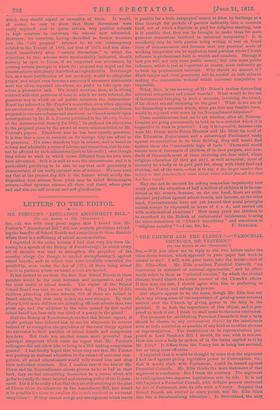LETTERS TO THE EDITOR.
MR. FORSTER'S " EDUCATION AMENDMENT BILL."
[TO THE EDITOR OF THE " SPECTATOR.")
Sin,—It was with very great regret that I found that Mr. Forster's "Amendment Bill " did not contain provisions extend- ing the benefits of School Boards and compulsion to those districts where there is a sufficiency of school accommodation.
I regretted it the more, because I had that very day been lis- tening to a speech of the Bishop of Peterborough, in which every art of rhetoric was used to strengthen the prejudice of the country clergy (as though it needed strengthening !), against school boards, and in which was very carefully concealed the possibility, even under the Act of 1870, of there being school boards in parishes where no board schools are needed.
It has seemed to me from the first that School Boards in these parishes would be the most harmless and inexpensive, and yet the most useful of school boards. The report of the Bristol School Board was sent to me the other day. They have 16,325 children attending efficient schools, 916 of these are indeed in Board schools, but that only makes my case stronger. By their efforts 4,000 more children are attending efficient schools than two years ago, and the addition to the rates caused by this useful school board has been only one-third of a penny in the pound !
Had the Bishop of Peterborough studied this Bristol report, it might perhaps have induced him to use his eloquence to remove instead of to strengthen the prejudices of the rural clergy against the extension to their parishes of school boards and compulsory bye-laws. But there was another reason more powerful than episcopal eloquence which made me regret that Mr. Forster's colleagues did not allow him to bring in a Bill making compulsion general. I had fondly hoped that when they saw that Mr. Forster was pushing on national education to the extent of universal com- pulsion, all sound educationists would rally round him and drop their individual crotchets. But I confess that if the bite of Mr. Dixon and his Nonconformist clients proves to be as bad as their bark, they are fast committing themselves to a course which will go far to justify the faint-hearted and wavering policy of the Govern- ment. For if it be really a fact that they are still straining at the gnat of Clause 25 or its substitute in the Amendment Bill, how would it be possible for them to swallow the camels involved in universal compulsion ? If they cannot accept any arrangement which leaves lit possible for a little ratepayers' money to filter by farthings at a time through the pockets of parents indirectly into a common fund, out of which a fraction is paid for religious teaching, how is it possible that they can be brought to make those far more generous concessions involved in universal compulsion ? It is manifestly only by both parties being willing to rest on broad lines of common-sense and fairness that any practical mode of working compulsion can be applied in rural parishes where Church influence is predominant both in wealth and numbers. Manage it how you will, not only some public money, but also some public influence, which is just as important as money, must indirectly go to back up predominant interests. Why should we conceal it ? Much temper and even generosity will be needed on both sides in making the concessions without which universal compulsion is impossible.
What, then, is the meaning of Mr. Dixon's motion demanding universal compulsion and school boards? What would be the use of Government bringing in such a measure, involving the camel, if his clients are still straining at the gnat ? What is the use of his demanding a measure which, when put into any feasible form, would be rejected with scorn by his Nonconformist followers ?
These considerations lead me to ask whether, after all, Noncon- formists are going permanently to hold on to a crotchet which it is impossible to work in practice? I say it is impossible, because even were Mr. Dixon made Prime Minister and Mr. Miall the head of the Education Department, and a subservient Parliament ready against its convictions to do their bidding, they still would find against them the " inexorable logic of facts." There still would remain tens of thousands of children of in-door paupers, and hun- dreds of thousands more of those receiving out-door relief, whose religious education (if they got any), as well as secular, must of necessity be wholly or in part paid for, along with their food and clothing, out of the rates,—that is to say, a far larger number than belong to that intermediate class about whose school fees all this dust has been raised.
May one not be excused for asking somewhat impatiently how many years the education of half a million of children is to be con- tinued in the streets, because, on the one baud, there are eccle- siastical prejudices against school boards, and because, on the other hand, Nonconformists have not yet learned that moral principles cannot always be expressed in terms of £ s. d., and carried out with mathematical exactness ? How many years are children to be sacrificed to the Moloch of ecclesiastical intolerance, bearing the name sometimes of " Church ascendancy " and sometimes of
"religious equality " ?—I am, Sir, &c., F. SEEBOHISf.


































 Previous page
Previous page